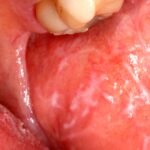
Lichen planus is a chronic inflammatory auto-immune disorder which can affect the skin, oral mucosa, genitalia, nails and oesophagus (Dental Elf – 22nd Nov 2017; Dental Elf 9th Jun 2021). The treatment of oral lichen planus (OLP) is symptomatic and includes the local application of steroids or non-steroidal anti-inflammatory agents, substances to enhance epithelial regeneration and elimination of predisposing factors ( Dental Elf – 20th Mar 2020). Topical corticosteroids remain the mainstay of therapy however do have adverse effects.
The aim of this systematic review was to evaluate the efficacy of dexamethasone in the treatment of OLP.
Methods
An electronic database search of PubMed/Medline, Cochrane Library and Web of Science were conducted up to 31st January 2021. Additionally, the last 10 months of relevant journals were hand-searched to identify eligible papers. Inclusion criteria included studies in English only, randomised control trials (RCTs) performed on patients with OLP and comparison of dexamethasone with one or more treatment strategies. The primary outcome was the assessment of pain, the secondary outcomes included resolution of clinical symptoms and changes in quality of life. The revised Cochrane risk of bias tool (RoB 2.0) for randomised control trials was used to assess study quality.
Results
- 8 RCTs were included in this systematic review.
- 4 studies had a low risk of bias and the remaining 4 studies had an uncertain risk of bias.
- 5% methylene blue mediated photodynamic therapy vs Dexamethasone 0.5mg/ml + Nystatin 100,000 IU showed no significant differences.
- Amlexanox paste (250mg: 5g per tube) vs Dexamethasone powder 0.043% dissolved in pure glycerol showed no significant differences.
- Self-formulated Dexamethasone rinse (0.5mg/20ml) vs Dexamethasone (0.5mg/2ml); the compounded formulation was superior (but not statistical calculation performed) to the self-formulated rinse in terms of convenience to use, positive compliance, patient-perceived faster onset of action and symptoms relief.
- Toluidine blue mediated photodynamic therapy vs Dexamethasone 0.5mg/ml + Nystatin 100,000 IU showed no significant differences
- Clobetasol + Ketoconazole + Amitriptyline (5ml) vs Dexamethasone 0.5mg/5ml + Nystatin 100,000 IU + Diphenhydramine; significantly greater improvement of pain and lesions and significantly shorter mean time of drug use for complete resolution of lesions and significantly higher patient satisfaction and significantly lower probability of the disease persisting for the Clobetasol/Ketoconazol/ Amitriptyline group.
- Methylene blue mediated photodynamic therapy vs low level light therapy vs Dexamethasone 0.5mg/5ml + Nystatin 100,000 IU; mean improvement in pain significantly greater in Dexamethasone group compared with the other two groups; the efficacy index of the photodynamic therapy group was significantly better than the low level light therapy and corticosteroid groups and there was a statistically significant lower relapse risk for corticosteroids in comparison with photodynamic therapy
- Dexamethasone 0.1mg/ml solution in Mucolox + Fluconazole 200mg or Nystatin suspension vs Dexamethason 0.1mg/ml + Fluconazole 200mg or Nystatin suspension; significantly better REU scores (reticulation/erythema/ulcer) and higher improvement in the total COMDQ score (chronic oral mucosal diseases questionnaire) in Dexamethasone + Mucolox group.
- Thalidomide 1% paste vs Dexamethasone 0.043% paste; no significant differences.
Conclusions
The authors concluded:
Although Dexamethasone is an effective therapeutic strategy for OLP, it is not better than clobetasol combined with ketoconazole/amitriptyline.
Comments
This systematic review highlights the different treatment options for OLP and their comparative effectiveness. Whilst there are long term adverse effects with Dexamethasone, the chronic nature of OLP requires a chronic treatment strategy. It is of interest to look for alternatives to Dexamethasone however the heterogeneity of included studies precluded meta-analysis. Further research is required to determine the effectiveness of the clobetasol combined with ketoconazole/amitriptyline treatment modality vs Dexamethasone before clinical practice can be informed.
References
Primary reference
Other references
Dental Elf – 22nd Nov 2017
Dental Elf – 9th Jun 2021
Dental Elf -4th Mar 2020
Oral Lichen Planus: Is treatment with corticosteroids safe and effective?
Picture Credits
Ian Furst, CC BY-SA 4.0, via Wikimedia Commons
